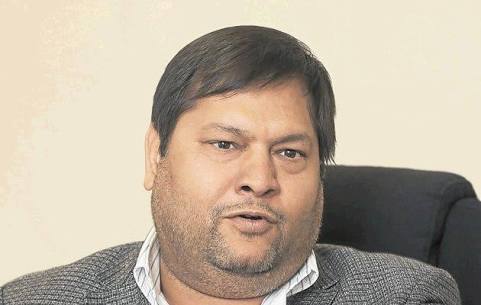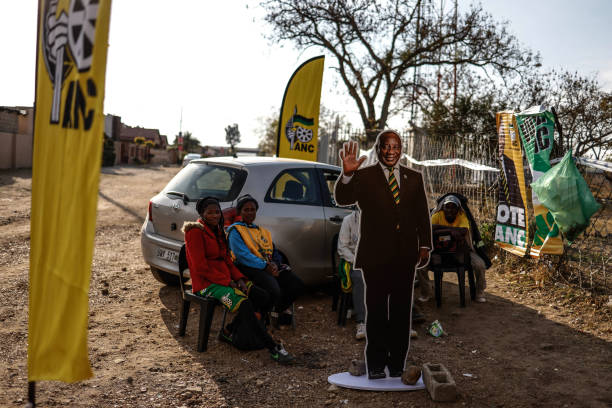
https://www.occrp.org/en/investigations/south-africas-public-protector-flagged-by-hsbc-in-connection-to-guptas
South Africa’s public protector Busisiwe Mkhwebane, who heads the country’s top anti-corruption body, was flagged by global banking giant HSBC as having financial links to the infamous Gupta family, according to banking records leaked to OCCRP.
The Guptas are at the center of South Africa’s Judicial Commission of Inquiry into Allegations of State Capture, which is currently holding hearings on the family’s role in grand corruption during former President Jacob Zuma’s time in office from 2009 to 2018.
The bank flagged a payment worth over US$5,000 into Mkhwebane’s account at First National Bank in South Africa in June 2014, during the height of the Gupta family’s influence over the Zuma government, the records show. The money was sent from an account at HSBC’s subsidiary in Hong Kong. First National Bank declined to comment citing client confidentiality.
The flag on Mkhwebane’s transaction was part of a highly restricted internal HSBC investigation that sought to identify a network of Gupta-linked accounts and companies around the world. The network’s key accounts and companies were located in Hong Kong, a tax haven that has been known for providing financial secrecy for foreign clients.
There is no indication of wrongdoing by Mkhwebane. However, HSBC included the payment among thousands of flagged transactions involving dozens of offshore companies that laundered payments structured as kickbacks from a Chinese rail company in a deal that involved Gupta associates.
In a statement to OCCRP, Mkhwebane’s spokesman Oupa Segwale said that the public protector has no links to the Guptas. She was not aware that she had been flagged by HSBC, the spokesman said, and no funds had been transferred in June 2014 to South Africa.
HSBC’s reason for identifying Mkhwebane as part of this network isn’t known to OCCRP. The payment she received was made just one day before she left her position in China as a South African Embassy official. She then returned to the Department of Home Affairs in South Africa.
OCCRP previously revealed how the Chinese company, China South Rail, won a $1.5 billion contract to sell locomotives to South Africa’s state-owned infrastructure company, Transnet, after paying a massive advisory fee to Salim Essa, a well-known business associate of the Gupta family. The deal was structured so that the payments were taken from Transnet and routed through Essa’s Hong Kong-based companies and accounts.
HSBC’s internal auditing team identified $114.6 million in transactions as originating from these payments, according to the documents obtained by OCCRP. Of that amount, $60 million was paid to offshore companies. Other payments funded shopping sprees at Calvin Klein and Rolls Royce and meals at The Spice Merchant and Costa Coffee in the United Kingdom.
When asked why Mkhwebane was flagged as potentially being part of the Gupta network, HSBC spokesman Ankit Patel didn’t answer directly.
“We continue to investigate any potential links to the Guptas or Gupta-related companies,” Patel said. “We will review any name that comes to our attention for potential involvement in financial crime and exit those relationships as appropriate.”
The bank also said in a 2017 statement to OCCRP that it had “no desire to do any Gupta-related business” and was working on severing its banking relationships with the family and its known associates, or had already done so.
Maira Martini, a senior policy advisor for Transparency International, said banks play a critical role as “gatekeepers” when they flag and report suspicious transactions. Such actions contribute to investigating and prosecuting criminal cases and help fight money laundering, Martini said.
Mkhwebane was appointed public protector under the Zuma administration in 2016, and is widely reported to be an ally of the ex-leader. She has previously come under fire for allegedly undermining an investigation into the Guptas’ plundering of a state project for dairy farmers.
On July 22, South Africa’s highest court said it had found that Mkhwebane acted “in bad faith” in pursuing a case involving ABSA bank, and ordered her to pay hefty legal fees.
Last week, Corruption Watch South Africa, a civil society group, sent a letter to the country’s parliament asking for an investigation into Mkhwebane’s fitness to hold office. “Mkhwebane has much explaining to do,” said David Lewis, the organization’s executive director. “[The alleged financial link to the Guptas] is further evidence of the public protector’s dishonesty and bias. This strengthens the demand for her impeachment.”
Mkhwebane’s office released a report this month accusing current President Cyril Ramaphosa, who succeeded Zuma and has backed the Commission on State Capture, of himself being involved in state capture by receiving what she described as “large sums of money” for the financing of his presidential campaign. She had previously accused Ramaphosa of being biased against her.
Her report was released three days after Zuma began his long-awaited testimony before the commission in mid-July, an appearance that was cut short after he said he couldn’t recall answers to most of the questions posed. The former president also used the opportunity to accuse unnamed forces of plotting against him.

